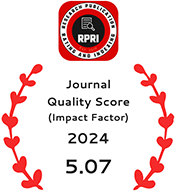Consumption of Functional Food by Cardiovascular Disease and Its Role in Disease Management
DOI:
https://doi.org/10.55544/jrasb.1.3.2Keywords:
functional food, globalization, hypertension, questionnaireAbstract
Consumption of functional food by cardiovascular disease patient plays a very important role in their management. Due to the increase globalization and changes in lifestyle, many adult populations are at high risk of hypertension and have contributed to high mortality and morbidity and related CVD risk. The purpose of this study is to assess the nutritional status of CVD patient and their intake of functional food. Many studies regarding functional food have confirmed that nutrition has great impact for prevention of chronic disease as most of them are consumed in daily life. The tool used for this study is questionnaire-based form which is physically ask by visiting the hospital. The expected outcome is we would get to know about if a patient is including any functional food in the diet and also, we would be able to know about the role of its in disease management. From this study, it has been found that many CVD patients are not aware of the importance of functional foods.
Downloads
References
Strasser, T. (1978). Reflections on cardiovascular diseases. Interdisciplinary science reviews, 3(3), 225-230.
Everson-Rose, S. A., & Lewis, T. T. (2005). Psychosocial factors and cardiovascular diseases. Annual review of public health, 26, 469.
Stewart, J., Manmathan, G., & Wilkinson, P. (2017). Primary prevention of cardiovascular disease: A review of contemporary guidance and literature. JRSM cardiovascular disease, 6, 2048004016687211.
Worldwide consumption of functional foods: a systematic review (Asli E Ozen, Antoni Pons, Josep A Tur) Nutrition Reviews, Volume 70, Issue 8, 1 August 2012, Pages 472– 481,
Shaida, B., Singh, K., Dubey, A. K., & Sharma, P. (2019). Anti-Depressant and Anti-Anxiety Like Effects of Cydonia Oblonga in Mice Exposed to Mild Stress. Indian Journal of Public Health Research & Development, 10(10).
Koul, H. L. (1992). M-estimators in linear models with long range dependent errors. Statistics & probability letters, 14(2), 153-164.
Functional Foods and Bioactive Compounds: A Review of Its Possible Role on Weight Management and Obesity’s Metabolic Consequences, by Melina Konstantinidi and Antonios E. Koutelidakis, Department of Food Science and Nutrition, University of the Aegean, Myrina, 81400 Lemnos, Greece. Medicines 2019. https://doi.org/10.3390/medicines6030094
Booth, G. L., Kapral, M. K., Fung, K., & Tu, J. V. (2006). Relation between age and cardiovascular disease in men and women with diabetes compared with non-diabetic people: a population-based retrospective cohort study. The Lancet, 368(9529), 29-36.
Schnohr, P., Jensen, J. S., Scharling, H., & Nordestgaard, B. G. (2002). Coronary heart disease risk factors ranked by importance for the individual and community. A 21-year follow-up of 12000 men and women from The Copenhagen City Heart Study. European heart journal, 23(8), 620-626.
Grodstein, F., Manson, J. E., Colditz, G. A., Willett, W. C., Speizer, F. E., & Stampfer, M. J. (2000). A prospective, observational study of postmenopausal hormone therapy and primary prevention of cardiovascular disease. Annals of internal medicine, 133(12), 933-941.
World Health Organization. Regional Office for the Eastern Mediterranean. (2010). A Practical Guide to Developing and Implementing School Policy on Diet and Physical Activity. World Health Organization.
Downloads
Published
How to Cite
Issue
Section
License
Copyright (c) 2022 Taw Yanie, Bushra Shaida

This work is licensed under a Creative Commons Attribution-NonCommercial-NoDerivatives 4.0 International License.


















